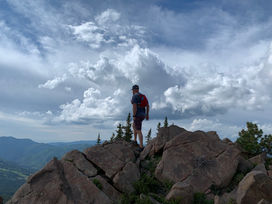In Case of Emergency
- Tony Pizza

- Nov 10, 2023
- 8 min read
The adrenaline begins coursing through my stomach and a touch of nausea settles in. My discomfort level increases with my shallow breaths. I’m about an hour from the AirBNB rental my partner’s friends have rented for the weekend. I’ll be spending time around her ex-boyfriend who has already shown signs of frigidness over group video and text chats. Fear is triggered and I feel my ego going into action developing emergency plans and mentally running through safety measures.

I’m in a classic fear response and the only comfort I default to is the imagined relief that might come if I can reasonably predict all the possible scenarios and see if I somehow still have control over what I can do in the situation. Though I’ve barely moved for 10 minutes, I feel exhausted and fully awake all at once. Psychologically, it’s worth sifting through my fears, my wounds, and why my body is responding this way, but to put it metaphorically, it’s hard to enjoy the serenity of a mountain lake if you’re also drowning in it.
In my experience, a foreseeable uncomfortable situation can bring one of the most low-level, energy-sapping situations a human can experience. It’s like small hole in an air mattress. By morning, you’ll be lying on the hard floor with back pains you’d rather not have.
The emergency response I’ve described above is so typical, I’m certain you’ve experienced this more than once in your life.
The main goal of this response is to create safety where it doesn’t seem possible in order to re-regulate the nervous system. This used to serve us well when hunger, cold, or saber-toothed tigers were imminent and real threats. According to Robert Lipton in The Biology of Belief amongst other experts, our body does not differentiate real fears from perceived fears. This means that the saber-toothed tiger and an uncomfortable encounter with a partner’s ex are creating a similar physiological response. Planning is a pseudo-solution.
Here’s the more uncomfortable truth to all of this planning for me. Even when I’m able to land on a plan that my psyche and my nervous system can both agree on, I will never have enough time and energy to plan for infinity. Sure I can predict likelihoods, but I’ll never be able to see every single possibility the universe can throw out at me. That means my plan is, at best, a general guideline that I’ve planned with excessive detail. It reminds me when I was in the military practicing combat moves. A sparing partner would throw a punch in slow motion, and the opponent would react in the prescribed manner. Even funnier is when someone said, “No. Punch me like this! That’s not the way you’re ‘supposed’ to punch me.” Of course the point is to practice the movements and have them become more instinctual, but I think the point is clear. Life rarely follows our wise plans.
Of course, we can sooth the ego, and do things to release the fear, but I believe there’s a mental practice much more beneficial than dropping into fear-response planning.
You know those red knives with all the little tools attached? What would it feel like to think of yourself more like one of those?
Swiss Army Knives aren’t functional because they have a plan for everything. Swiss Army Knives are tools that help manage any situation better than if you didn’t have one. Having a plan is like having a hammer and only using it for pounding or prying nails. Having a tool means you get to use it for whatever function your imagination can think up. Take the the flat head screw driver section of a Swiss Army Knife. Is its only function to screw and unscrew flat head screws? Could you use it as a pry bar? A leather punch? A digging tool in wood?
Here’s the main point: We can spend a lot of our energy planning and re-planning for situations that may or may not come true. Chances are, our plans will not have accounted for all the possibilities and something else will be thrown at us, making all that energy we spent on planning, in a sense, less effective. Alternatively, we can develop really good tools and skills and trust those tools and skills to meet whatever situation is thrown at us. Chances are, we’ll be able to respond, adapt, and “survive” the situation better, while conserving a lot of more energy in the process.
In essence, we won’t have to fret and worry an hour before the situation occurs, which will be an hour lost doing something more productive and enjoyable. For me on that drive to the AirBnb, I could have enjoyed the scenery, sang along to songs at the top of my lungs, had a fun conversation, or even rubbed my partner’s neck. I would have enjoyed that hour more, and I would have been equally prepared to handle whatever awkward, uncomfortableness was bound to be there. And the truth of it is, it wouldn’t have been a rehearsed response either. It would have been genuine, authentic, and with at least an hour’s worth of conserved energy.
Here are some of my tools and skills that I’ve tried to develop to better handle a variety of situations.
What I try to carry in my Swiss Army Knife
1. Awareness
I put this first because it’s the foundation of everything. When I’m deeply aware of how I’m feeling, it allows me to conscientiously respond. The longer the gap is between an event and my response, the better chance I have of making a good long-term decision. If I’m able to repeat this over and over, it gives me the best chance at making choices that support my ideal way of living.
How to sharpen this tool and skill? Meditation. This doesn’t have to be monastic meditation where we spend hours on a cushion and watch our thoughts pass. While this type of meditation is helpful, my two most practical forms of meditation are where I simply watch my thoughts come and go and try not to attach my attention to them. If I notice that I’ve got lost in thoughts, that’s awareness, and I try to let it go and return to focusing on my breath, or the beating of my heart, or my thoughtless mind. It’s like a muscle that we exercise, this type of awareness. The second comes from the teachings of Thich Nhat Hahn. He describes this famously as walking meditation, but it really can be applied to any action. It means to be fully absorbed in that action and noticing when you’ve drifted away from this. This is why I love rock climbing so much. The danger and physical demand almost requires a single-focus on the activity in order to do it well. Another place I practice this is when I’m washing dishes. My mind can easily drift away because it’s a “mindless” activity. But when I focus on the bubbles, the scrubbing, the rinsing, it’s deeply satisfying and very meditative.
2. Breath
Nearly every one of my coaching sessions begins with some deep breaths, for cleansing, for grounding. James Nestor goes into great lengths about our breath in his book Breath for an interesting read on the subject, while Wim Hof has a Youtube series, app, and almost cult-following around the topic. The key is that the breath is always with us. It’s our most obvious sign of life, and the most necessary. It’s an amazing tool because it’s passive when we aren’t paying attention to it, but as soon as we want, we can make it voluntary.
• Box Breath helps me calm down when I feel particularly anxious. In for four seconds. Hold for four, out for four, and hold for four. Repeat as often as you want.
• Extended Inhale helps me calm down and focus, too. This is when my exhale is slightly longer than my inhale. In for six seconds, out for eight; or in for 7 seconds, out for nine. The time is less important than the slow, complete exhale after a deep, full, inhale.
• Wim Hof and Double-Barrel Breath both help create panic, but then quickly regulates into a very meditative breath hold, and serene experience afterward. I recommend more education and practitioner support on both of these techniques before trying them out on your own. This YouTube video was a good place when I started.
3. Acceptance
The practice of accepting what is doesn’t mean we necessarily are OK with it. Think of rain on your wedding day. (Yes, I know it’s ironic.) You don’t have to be OK with rain being there, but you not being OK with it won’t change the fact that it’s raining. The act of embracing the fact that it’s raining changes the dynamic. This isn’t an attempt to bypass emotions, it’s more about embracing the opportunity of an unexpected event. What could be more memorable and uplifting than a wedding dress and a tuxedo soaked through an impromptu dance party in unexpected thunderstorms. In the martial art discipline Judo, the opponent’s weight and momentum is used to the advantage of the other person. It's effective and less effort. This applies to sticky situations, too. What does the situation invite and what can be gained from it?
4. R.A.I.N.
Speaking of rain, renowned thinker, author, and meditation expert Tara Brach outlines a beautiful technique called R.A.I.N. which stands for:
R - Recognize. (Awareness around the emotions and what is happening.)
A - Allow. (Allow the emotions to be there without fighting them. They want to be heard. They don’t want to destroy you.)
I - Investigate. (What’s causing this? What’s the root?)
N - Nurture. (Having self-compassion for what’s coming up. No need to add guilt, shame, or other emotions on top of what’s already happening.)
This technique, when practiced, can have an enormous impact on how a situation flows through us. It's also applicable to addiction awareness, which can be the foundation for quitting, which I've seen be very successful in my own additions, and those of my clients.
Conclusion

Within my own personal experience of that trip to the AirBnb, becoming a Swiss Army Knife did not fully take away some apprehension and awkwardness in the beginning of the weekend. It just allowed me to face the issue bravely and with the skillful confidence that I hope I can have in all situations. I said a quick hello to meeting my partner’s ex in person for the first time. I might have even given a friendly hug (I honestly don’t remember) and I went through the weekend with some momentary discomfort here and there, but mostly was able to focus on myself, my partner’s birthday, and the experience that I intended to have. Breaths helped when I was especially uncomfortable, and awareness was helpful when I wanted to opt out of a situation or moment instead of letting anger or frustration get the best of me. All in all, I wasn't in trauma response at all through the weekend, and I can look back and say that there's nothing I wish I would have done differently. Being able to enjoy myself to fullest and walk away with zero regrets is what I hope to take from any and every situation. This wasn’t because the plan went smoothly, it was because I was able to act smoothly in the rough moments and handle them in a way I could feel great about, both in the moment, and in retrospect. Probably the biggest key is that I didn’t try them out for the first time in the moment. It was something I was used to doing over and over, and they came to serve me really well when I needed them most. TP.



















I wrote about my Swiss Army knife this morning. Felt good. Thank you.